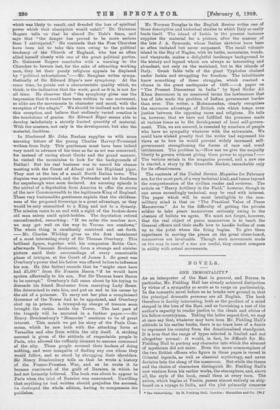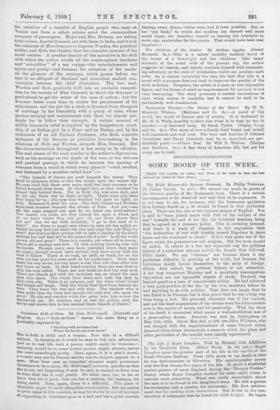NOVELS.
ONE IMMORTALITY.*
As an interpreter of the East in general, and Burma in particular, Mr. Fielding Hall has already achieved distinction by virtue of a sympathy so acute as to verge on partisanship. In the romantic novel before us he breaks new ground in that the principal dra9natis personae are all English. The hook therefore is doubly interesting, both as the product of a mind steeped in the lore of the East, and as furnishing a test of the author's capacity to render justice to the ideals and ethics of hie fellow-countrymen. Taking the latter aspect first, we may at once say that, whatever may have been Mr. Fielding Hall's attitude in his earlier books, there is no trace here of a desire to represent his country from the denationalised standpoint. It is true that the range of types selected is limited and not altogether normal : it would, in fact, be difficult for Mr. Fielding Hall to portray any character into which the element of mysticism did not enter. Even the more commonplace of the two British officers who figure in these pages is versed in Oriental legends, as well as classical mythology, and never deviates into the slang of the messroom. But while the theme and the choice of characters distinguish Mr. Fielding Hall's new venture from his earlier works, the atmosphere, and, above all, the style of the book, recall them at every turn. The action, which begins at Venice, passes almost entirely on ship- board on a voyage to India, and the plot primarily concerns * Ono Immortality. By B. Fielding Lfall. London : maciathan and Co. Pod n
the relations of a handful of English people who. meet at Venice and form a select coterie amid the cosmopolitan company of passengers. Major And Mrs. Holman are taking their cousin, Amitie Ormond, out with them to India, and it is in the relations of Miss Ormond to Captain Warden, the practical soldier, ad Holt, the idealist, that the romantic interest of the novel centres. A peculiar feature of the narrative is the skill with which the author avoids all the commonplace incidents and " actualities " of a sea voyage—the entertainments and Sports and gossip—and focusses the attention of the reader On the glamour of the seascape, which . passes before our eyes to an obbligato of idealised and somewhat exalted con- versation between the chief characters. The two men, Warden and Holt, gradually drift into an amicable competi- tion for the society of Miss Ormond, in which the dreamer is predestined to get the better of the man of action ; but the dreamer takes some time to realise the genuineness' of his attachment, and the girl for a while is diverted from thoughts of marriage by her friendship with a group of nuns, whose Perfeet serenity and contentment with their lot almost per- Suede her to follow their example. A certain amount of mildly humorous relief is supplied by the tempestuous court- iihip of an Indian girl by a Dane and an Italian, and by the Comments of an old German Professor, who finds concrete instances of his theories on primitive love-making in the relations of Holt and Warden towards Miss Ormond. But the characterisation throughout is too misty to be effective. The real charm of the book resides in the author's digressions, such as his musings on the death of the nun, or the delicate and poetical passage in which he laments the passing of romance from a world in which every place is "ruled, levelled, and flattened by a machine called Law ":—
"The Islands of Desire are sunk beneath the waves. They lived in phantasy alone, or like the clouds upon the sunset sky. No man shall find them ever more, shall feel their summer or be lulled beneath their trees. So thought they as they watched the sunset fade behind them. For in front the seas were dark, and In the sky there was no flush, no light. There were only stars that hung far up ; like eyes that watched but gave no light, no help. Romance is dead for ever. She with Chance and Fortune have been crushed beneath the wheels of Fate. And yet,—are all the ways mapped out and do we know our destinations? Our hearts, our souls, are they turned too upon a wheel, and do we know where they will go ? Or are there charts that
tell us ? Can we say with certainty, go to this land or to that?' . Are there no magic seas where no man yet has sailed, no island we may find and make our own and reign the only King for ever? Are there no fairy princes left to take a maiden by the hand, awaken her and lead her to his palace all of gold? Is all the world grown old and grey ? There is a country yet where all is young Where all is strange and new. Of that country nothing ever will be known. Though many men have traveled there, they make no maps; though women have arrived they have never told the road to follow. There is no road, no path, no track, for no one ever yet has gone the same path as his predecessor. Each must make his way alone, his way anew, a way that will close after him and leave no trace. In that heart country there are seas that no ship has ever Bailed. There are new lands no foot has ever trod. There are islands girt with the inviolate sea, an island for each man who dares. The winds blow there and waft the ship in their own way. There is no compass, and the stars wheel round and round and laugh. Only the winds that blow from heaven are true, They know the way and only they. The mariner who is wise quits then the helm and spreads his sails and sits upon the Prow. He site and watches while the gales take him across the uncharted sea. He watches, and at last the golden mist dis- solves and shows him he has reached these Islands of Desire."










































 Previous page
Previous page